Revolutionizing UPS Systems with Toshiba’s SCiB Energy Storage: Enhanced Reliability and Efficiency
2024/11/29 Toshiba Clip Team
- Critical Need for UPS Systems: Power outages can result in significant financial losses for businesses due to downtime and disrupted operations. Toshiba’s SCiB™ (Lithium Titanate Oxide) Energy Storage System (ESS) ensures continuous power during outages, helping businesses avoid costly interruptions and maintain productivity.
- Rapid Power Restoration for Critical Sectors: In data centers and healthcare facilities, where uninterrupted power is essential, SCiB batteries can charge up to 80% of their capacity within minutes, ensuring fast recovery and minimal operational disruption.
- Sustainability, Safety, and Cost Efficiency: SCiB batteries offer a long operational lifespan, high recyclability, and advanced safety features that minimize the risk of thermal runaway, reducing environmental impact, operational costs, and enhancing reliability in critical applications.
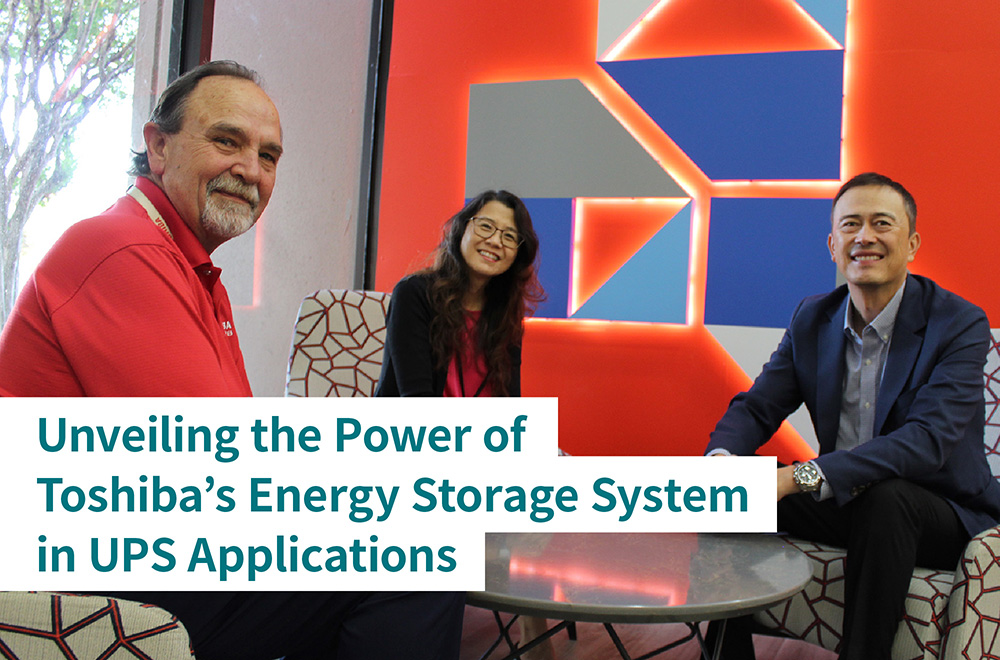
In an era defined by technological breakthroughs such as AI, and by ever-increasing energy demands, the importance of reliable energy storage and an uninterruptible power supply (UPS) systems that provide backup power and protect electronic equipment from power interruptions and fluctuations cannot be overstated. In 2022, the United States experienced 18 separate natural disasters that significantly impacted the power grid. These outages hurt the economy significantly. The Department of Energy estimates that power outages cost American businesses $150 billion annually*. Without robust energy solutions, organizations risk productivity losses and potential damage to critical equipment due to unreliable power.
Businesses rely heavily on a continuous power supply to maintain operations, protect data, and uphold rising customer performance expectations. The complexity and interdependence of digital systems mean that even short power outages can cause significant financial losses and harm an organization’s public reputation. Therefore, it’s vital for businesses to have a strong, continuous energy supply utilizing UPS systems to minimize disruptions and maintain operational continuity.
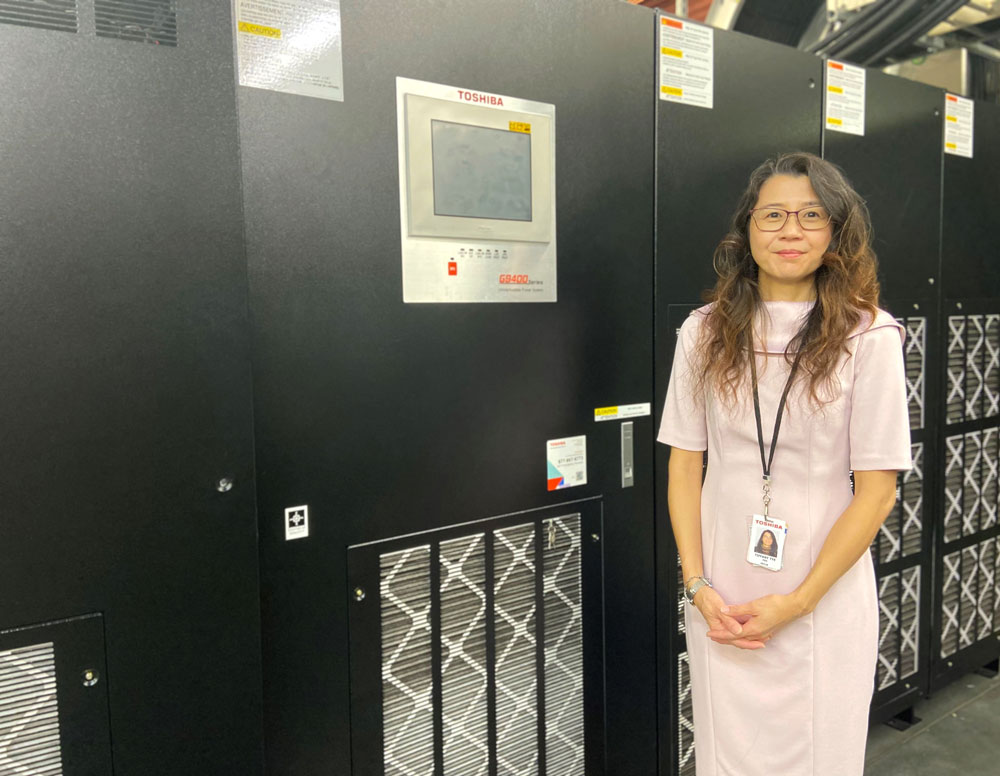
“The UPS is essential for business for several key reasons,” said Tiffany Tye, Assistant General Manager at Toshiba International Corporation (TIC). “First and foremost is operational continuity. The UPS helps prevent downtime and maintain continuous operation of machinery, equipment, or data servers. A reliable UPS and ESS, such as the Toshiba UPS and SCiB ESS, supports data protection by integrating with comprehensive backup systems. These systems include secondary power sources, such as generators, hydrogen fuel cells, or other alternate power supply technologies, so there is smooth transition to alternative sources and preserving critical business operations and data storage.”
Challenges Businesses Face with Energy Storage Solutions and Power Outages
Businesses encounter numerous challenges when managing energy storage and mitigating power outages. Traditional energy grids often struggle to meet fluctuating demands, leading to grid instability and blackouts. Additionally, integrating renewable energy sources into existing grids poses technical and logistical hurdles due to their intermittent nature. Businesses must navigate these challenges while upholding a consistent energy supply to keep operations running smoothly.
“The first step businesses need to do is conduct a risk assessment,” Tye said. “They must identify their areas of vulnerability to power outages and grid instability. Then, they should determine the type of UPS, ESS, and backup generator needed.”
Effective energy storage solutions, such as advanced battery technologies, play a significant role in stabilizing power supply and providing backup during outages, ultimately enhancing resilience and efficiency.
Uniqueness and Characteristics of Toshiba’s SCiB Energy Storage System
Toshiba has a long history of developing cutting-edge battery technologies, culminating in the introduction of its SCiB LTO—lithium-titanate oxide—batteries in 2008. Leveraging decades of expertise in materials science and electronics, Toshiba pioneered advancements in rechargeable battery technologies, prioritizing safety, rapid charging and discharging capabilities, and extended lifespan. SCiB batteries are particularly renowned for their high thermal stability, fast charging and discharging capabilities, and longevity, making them ideal for applications demanding reliable and sustainable energy storage solutions.
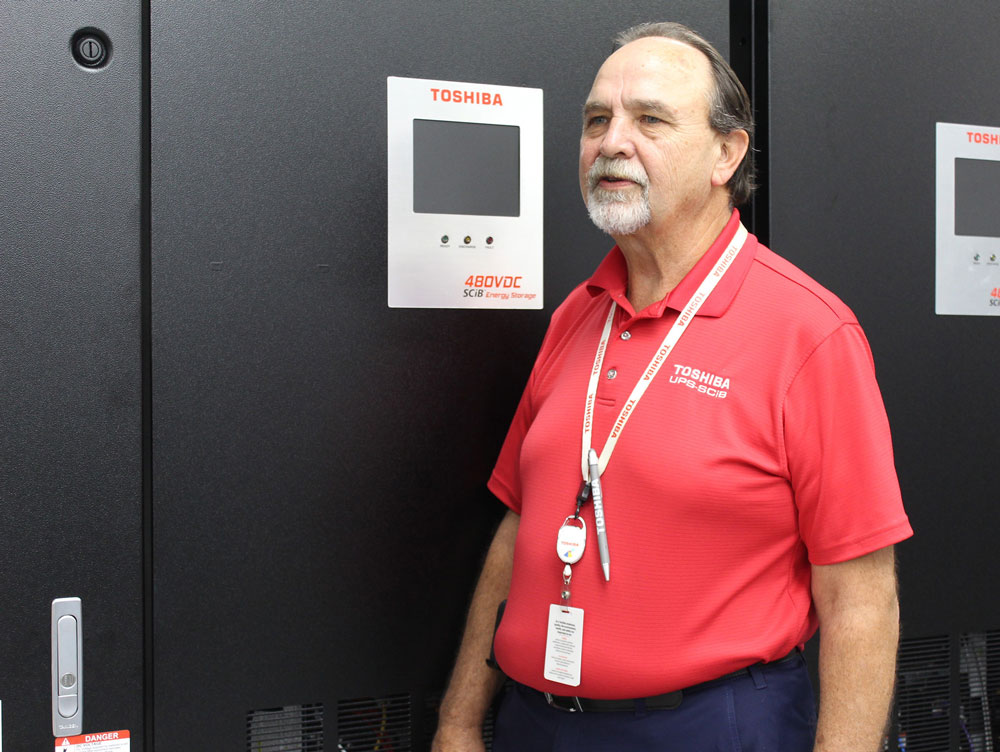
“The longer the product lasts, the smaller the carbon footprint for logistics and replacements. A 15-to-20-year lifespan is not uncommon for our product,” said Steve Unger, Associate Director of Product Management at TIC. “SCiB batteries have a lifespan of over 20 years, and after their initial use they can be recycled or repurposed by Toshiba for other energy storage applications, supporting Toshiba’s commitment to ecological sustainability.”
Toshiba integrates SCiB lithium-ion battery solutions with its UPS systems, which offer a longer lifespan and higher efficiency compared to traditional lead-acid batteries. Lithium-ion batteries are also more recyclable and have a smaller carbon footprint.
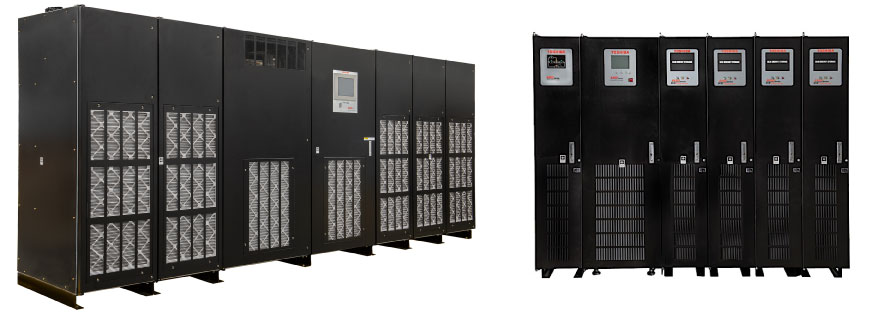
4400 SERIES 20kVA UPS, MBS, & Battery Cabinets (right)
Key chracteristics of the SCiB battery solution include:
- Wide Temperature Range: SCiB batteries can operate effectively across a wide temperature range (-30°C to 55°C), ensuring effective operation in diverse environmental conditions.
- Extended Cycle Life: SCiB batteries offer an impressive cycle life of over 20,000 cycles, enduring thousands of charge-discharge cycles without significant degradation. This longevity reduces the need for replacements, resulting in lower long-term costs and reducing downtime.
- High Safety Standards: SCiB batteries feature stable chemistry that minimizes the risk of thermal runaway, even under harsh conditions, providing a secure and dependable energy source.
- Diverse Application Impact: Toshiba’s UPS systems are essential across various critical power sectors, including data centers, healthcare, manufacturing, and telecommunications, providing continuity and operational efficiency for all critical power applications.
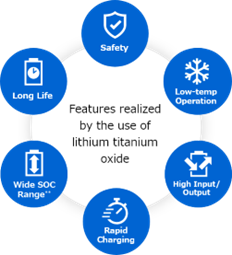
SCiB batteries are engineered to deliver exceptional performance across a wide temperature spectrum, making them suitable for diverse environments. From the heat of industrial operations to the frigid conditions of outdoor installations, these batteries have proved to be reliable and efficient. By harnessing advanced power electronics, control technologies, and high-energy efficiency products like the SCiB lithium-ion battery solution, Toshiba contributes to reducing energy consumption and operational costs, which is vital for organizations’ bottom line.
Various UPS Applications in the US Market and Their Impact
UPS systems were initially created to ensure that critical equipment, such as data centers, medical devices, and telecom systems, remain operational during power outages. This is essential for business continuity and community welfare, especially during turbulent and severe weather.
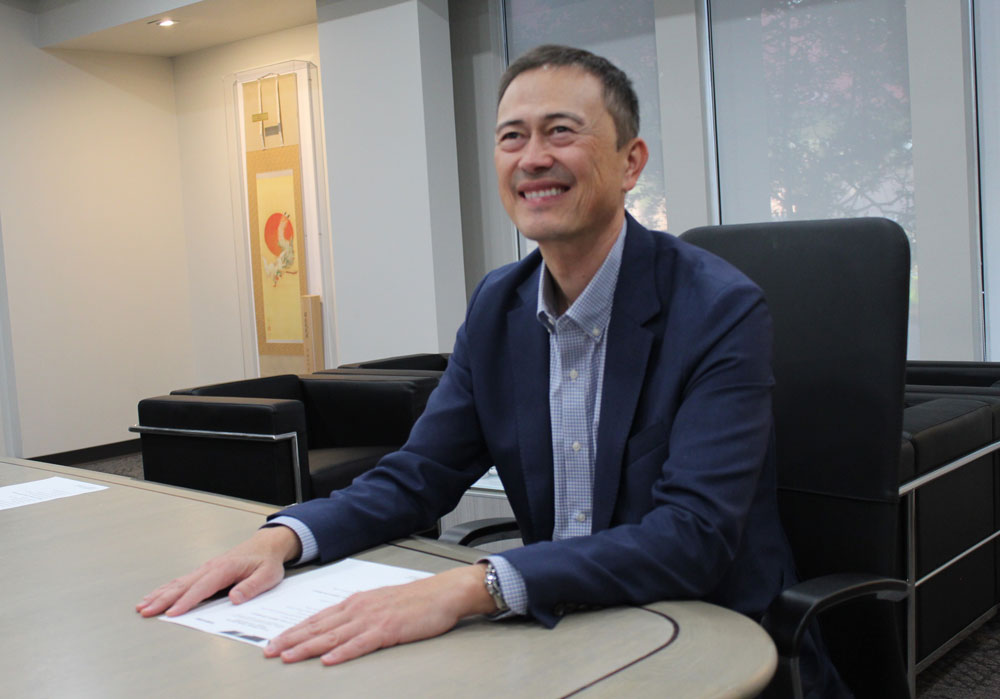
“Essential equipment, usually servers, was online and tied to a generator,” said Kenji Williams, National Sales Manager at TIC, discussing the early development of UPS systems. “When there’s a power outage, generators take a while to kick on and start working, so UPS systems bridge that gap, maintaining continuous power. This principle applies to newer technologies like medical devices and X-ray machines, which also require uninterrupted power.”
If an organization fails to implement a UPS system and lacks a backup power source, such as a generator, the loss of power could lead to worker downtime and significant financial costs. For instance, a retail business without a UPS system but with a backup generator may face a brief power outage. During that brief power loss, the electronic dollar transaction equipment must reboot, which may take minutes, preventing customers from processing orders and potentially costing the business millions of dollars.
Toshiba has developed UPS systems with various functionalities that contribute to a more resilient and efficient power infrastructure, ultimately benefiting both customers and society. Examples of sectors where SCiB ESS and UPS systems make a significant impact include:
- Data Centers: With the exponential growth of data, the need for reliable power in data centers has never been higher. SCiB ESS reinforces uninterrupted operations, safeguarding critical information and maintaining business continuity. Our SCiB ESS is used in some of the largest hyperscale data centers in North America, where maintaining power continuity is necessary for both public safety and business operations.
- Healthcare: In healthcare settings, where power interruptions can affect critical medical equipment and patient health analysis (X-Ray, CT, MRI, PET scans, blood analyzers, electron microscopes, etc.), our UPS systems provide a stable power supply to essential healthcare equipment and systems, ensuring patient safety and operational efficiency.
- Manufacturing: The manufacturing industry relies heavily on continuous power for production lines and machinery. Toshiba’s UPS solutions help prevent costly downtimes and maintain productivity by providing seamless power transitions during outages. Notably, our own TIC manufacturing factories utilize these UPS solutions to reinforce uninterrupted operations and maintain high productivity standards.
- Telecommunications: As the backbone of modern communication, telecom networks require robust power solutions. Our UPS systems support uninterrupted service, enabling reliable connectivity and communication across the country.
Toshiba’s SCiB Energy Storage System is revolutionizing the landscape of energy storage and UPS applications in the U.S. and around the world. Through our commitment to safety, innovation, and customer-centric support, Toshiba continues to empower businesses with reliable, efficient, and resilient power solutions.
Related Links
*This section contains links to websites operated by companies and organizations other than Toshiba Corporation.
Toshiba International Corporation







